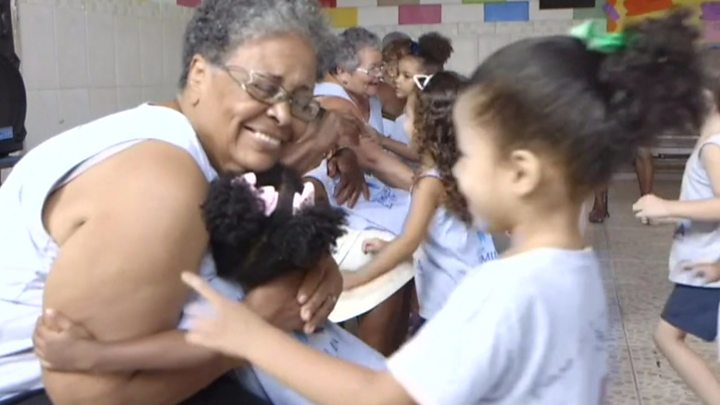Rio violence: Protests as girl, eight, ‘killed by police’
The eight-year-old Brazilian girl was with her grandmother in a van when she was hit in the back. …

 Image copyright Family picture/Voz das Comunidades
Image copyright Family picture/Voz das Comunidades Protests have erupted in Brazil’s Rio de Janeiro after an eight-year-old girl was allegedly killed by police, as the number of victims in operations by security forces continues to rise.
Ágatha Vitória Sales Félix was with her mother in a van when she was shot in the back in a poor area on Friday.
Residents said officers had targeted a motorcyclist when she was hit. Police said they had responded to an attack.
A record 1,249 people have died in such raids in Rio from January to August.
Ágatha is the fifth child to die as a result of violence blamed on the police.
Critics say the hard-line approach of conservative Governor Wilson Witzel, who came to office in January, is behind the growing number of victims in the city’s poorest areas, called favelas.
On Saturday, dozens of people protested in Alemão, one of Rio’s largest favelas, where Ágatha was hit on Friday night. She was sent to a hospital but died.
Some of the demonstrators carried placards saying “Lives in the favelas matter” and “Stop killing us”. Other protests were planned for Sunday.
In a statement, police said officers had responded to attacks, leading to a confrontation with criminals. An investigation has been launched.
But Ágatha’s family disputed this, saying officers had targeted a motorcyclist when she was hit, and there was no gunfight happening at the time.
“A guy came on a motorbike and the police asked him to stop. He didn’t stop and left, he was unarmed, and the police shot. There was no confrontation, the only shot was [from the police],” the girl’s uncle, Elias, told local media.
Another death for the statistics
By Hugo Bachega, BBC News
Another poor, black family in mourning in Rio; another young, innocent life lost to a tragedy that spares almost no-one in the city’s favelas. And, sadly, no sign that it will make any difference.
Governor Witzel has promised to fight violence with violence, a policy that has been tried in the past and has largely failed in achieving any lasting result. As more and more people die he has insisted he is on the right track and, outside the poorest districts, many see it as the price to be paid in an effort to reduce crime.
In the favelas, obviously, it is a different story. When I visited Alemão to cover yet another death blamed on the police, residents were almost unanimous in telling me how they see trigger-happy agents as the source of most of the violence.
Ágatha’s smiley face was on the front page of many newspapers in Rio. But as Ailton, her grandfather, said, she is likely to become just another statistic. Perhaps even worse, the chance that the family will ever see any justice is close to zero.
Governor Witzel has not commented on Ágatha’s death. He has adopted what many describe as a policy of confrontation, employing heavily armed officers and even helicopters with snipers to fight powerful drug gangs in densely populated favelas.
Number of people killed in police operations in Rio
Mr Witzel has often cited a drop in homicides and other crimes as proof that his policies are working. But experts say it is not clear if this is a direct result of his approach.
Far-right President Jair Bolsonaro, who also defends the use of force against suspects, has repeatedly said that “a good criminal is a dead criminal”.
More about life in Rio’s favelas

Media playback is unsupported on your device




